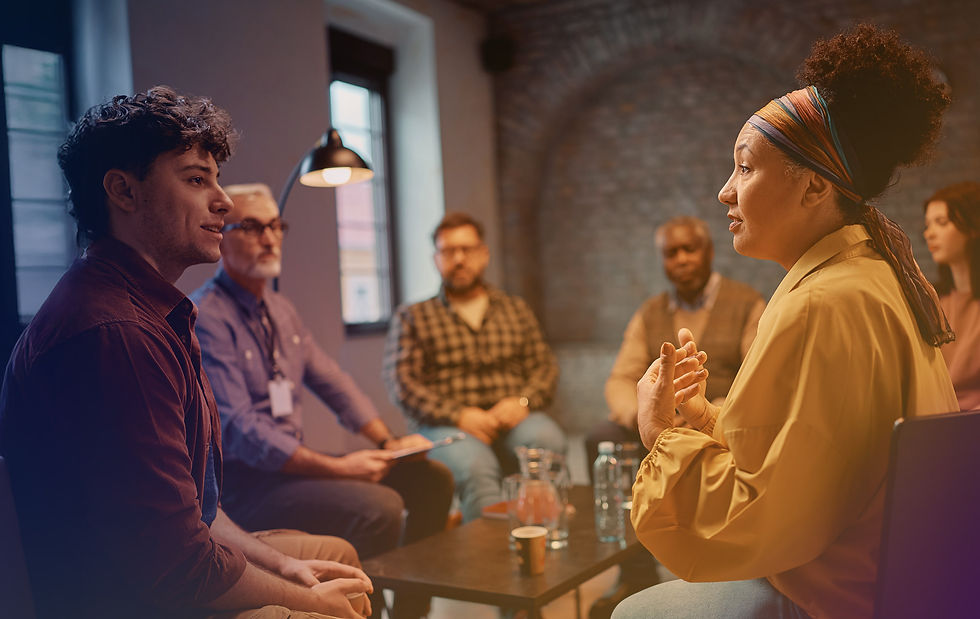Why community matters for mental health
- May 12, 2025
- 4 min read
Exploring the vital link between belonging and emotional wellbeing this Mental Health Awareness Week

Mental Health Awareness Week 2025, spearheaded by the Mental Health Foundation, is shining a spotlight on a theme that affects every one of us: community. At a time when loneliness is rising and many people are feeling increasingly disconnected, this year’s theme couldn’t be more timely.
Research consistently shows that a strong sense of belonging and social connection plays a powerful role in protecting and promoting good mental health.
So, what does ‘community’ really mean in a mental health context — and how can we all help foster it?
In this blog, we explore the psychology of belonging, the impact of loneliness on the brain, and how community, in all its forms, can support recovery and resilience.
What is community in a mental health context?
We often think of community as a geographical place — a neighbourhood, town, or workplace. However, in terms of mental health, community is more about connection than location. It refers to the people, relationships and environments that give us a sense of safety, acceptance and purpose.
Community can look like:
A peer support group or therapy group
A friendship circle or family network
A shared cultural or religious group
A team at work, school or sport
Even a trusted online space
At Schoen Clinic, we see firsthand how group therapy and social connection can play a powerful role in mental health recovery. Whether it’s sharing experiences with others who understand or simply feeling less alone in your struggles, being part of a supportive group is often a turning point in someone’s healing journey.
The psychology of belonging
The need to belong is not just a social nicety — it's a basic human need, as fundamental as food and shelter. Psychologist Abraham Maslow included belonging as a core tier in his hierarchy of human needs, and newer research continues to confirm this.

When people feel connected, included, and accepted, it supports:
Emotional regulation
Self-esteem and identity
Reduced risk of depression and anxiety
Stronger resilience to life stressors
In contrast, when we feel excluded, isolated or rejected, it can activate areas of the brain associated with physical pain. Belonging isn’t just ‘nice to have’ — it’s essential for emotional and physiological wellbeing.
How loneliness affects the brain
Loneliness isn’t just a feeling — it’s a serious mental health risk. In fact, studies show that chronic loneliness can:
Increase the risk of depression, anxiety, and suicidal thoughts
Lead to higher stress hormone levels (like cortisol)
Impair immune function
Affect sleep, cognition, and self-worth
Recent neuroscience research has shown that loneliness actually alters the way the brain processes social information. People who are persistently lonely may become hyper-vigilant to social threats or rejection, which can make it harder to connect, creating a vicious cycle.
At Schoen Clinic Chelsea in London, many of our patients speak about loneliness as both a cause and a consequence of their mental health difficulties. That's why part of our therapeutic approach includes rebuilding relationships, supporting group engagement, and helping people feel part of something again.
Building resilient communities that support mental wellbeing
So, how can communities, from local groups to national networks, protect mental health?
Here are some of the key ways:
Reducing stigma: Open conversations in the community reduce shame around mental health struggles.
Promoting early support: Trusted community services and networks encourage people to seek help sooner.
Providing structure and meaning: Being part of something bigger than ourselves gives us purpose and routine.
Creating safety nets: Community groups can help identify people who are struggling and offer early intervention.
Community doesn't have to mean hundreds of people. Even a small group of trusted individuals can act as a protective buffer against life's challenges. Why not contact our team if this is something you'd like to explore further with our specialists?

Ways to cultivate belonging in everyday life
Whether you're struggling with your mental health or want to support others, there are everyday ways to build more connection and community:
1. Join a group with shared interests
Whether it’s a book club, walking group, or therapy group, shared activity fosters connection.
2. Volunteer or give back
Helping others can boost your own sense of purpose and belonging.
3. Reach out — even when it’s hard
Loneliness can be self-perpetuating. Taking small steps to reconnect, even just saying hello, makes a difference.
4. Create safe spaces for honest conversations
You don’t need to be a mental health professional to listen without judgment.
5. Be consistent
Belonging grows through repeated, meaningful interactions, not one-off gestures.
How Schoen Clinic supports connection and recovery
At Schoen Clinic Chelsea, we understand that healing doesn't happen in isolation. That’s why many of our treatment plans include group therapy, peer support, and community-based interventions. From trauma-focused sessions to reflective therapy groups, we help people find belonging, rebuild trust, and rediscover hope.
If you or someone you care about is feeling isolated, anxious or overwhelmed, know that you're not alone — and help is available.
Explore our specialist therapy groups
Meet our mental health specialists
This Mental Health Awareness Week, let’s remember:
Community isn’t just about where we are, it’s about who we’re with. Together, we can create a world where everyone feels seen, heard and valued.
Get involved this #MentalHealthAwarenessWeek by sharing with the hashtag #ThisIsMyCommunity



